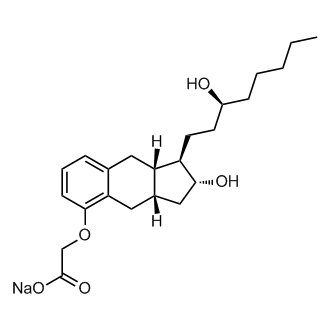| Size | Price | Stock |
|---|---|---|
| 1mg | $60 | In-stock |
| 5mg | $110 | In-stock |
| 10mg | $176 | In-stock |
| 25mg | $352 | In-stock |
| 50mg | $563 | In-stock |
| 100mg | $845 | In-stock |
| 200 mg | Get quote | |
| 500 mg | Get quote | |
| We match the lowest price on market. | ||
We offer a substantial discount on larger orders, please inquire via [email protected]
or Fax: (86)21-58955996
Inquiry for price and availability only. Please place your order via our email or fax.
| Cat. No. : | HY-16504 |
| M.Wt: | 412.49 |
| Formula: | C23H33NaO5 |
| Purity: | >98 % |
| Solubility: | DMSO : ≥ 26 mg/mL (63.03 mM); H2O : 16.67 mg/mL (40.41 mM; Need ultrasonic) |
Treprostinil (UT-15) sodium is a potent DP1 and EP2 agonist with EC50 values of 0.6±0.1 and 6.2±1.2 nM, respectively. IC50 & Target:EC50: 0.6±0.1 nM (DP1), 6.2±1.2 nM (EP2)[1] In Vitro: Treprostinil sodium has high affinity for the DP1, EP2 and IP receptors (Ki=4.4, 3.6 and 32 nM, respectively), low affinity for EP1 and EP4 receptors and even lower affinity for EP3, FP and TP receptors. Activation of IP, DP1 and EP2 receptors, as with treprostinil, can all result in vasodilatation of human pulmonary arteries[1].Treprostinil sodium inhibits viability of cultured endothelial colony forming cells. Endothelial colony forming cells proliferation is stimulated by conditioned media from Treprostinil pretreated mesenchymal stem cells[5]. In Vivo: Inhaled treprostinil sodium, a prostacyclin analog, is the most recent agent to receive FDA approval for the treatment of a fatal orphan disease: pulmonary arterial hypertension (PAH)[2]. Treprostinil preserves the sinusoidal endothelial cell lining and reduces platelet deposition early post-transplantation compared to placebo. Hepatic tissue blood flow is significantly compromised in the placebo group, whereas treprostinil maintains blood flow similar to normal levels[3].Treprostinil treatment significantly increases the vessel-forming ability of endothelial colony forming cells combined with mesenchymal stem cells in Matrigel implanted in nude mice. Silencing VEGF-A gene in mesenchymal stem cells also blocks the pro-angiogenic effect of Treprostinil[4]. Treprostinil is most efficacious in raising intracellular cAMP levels in murine and human hematopoietic stem and progenitor cells[5]. Treatment with Treprostinil significantly reduces the recruitment of cells compared to normoxic mice. Treprostinil also reduces right ventricular systolic pressure and slightly reduces the vascular remodelling but fails to reverse the right ventricular hypertrophy[6].
Lorem ipsum dolor sit amet, consectetur adipisicing elit. Autem earum hic iste maiores, nam neque rem suscipit. Adipisci consequatur error exercitationem fugit ipsam optio qui, quibusdam repellendus sed vero! Debitis.
Inquiry Information- Product Name:
- Treprostinil (sodium)
- Cat. No.:
- HY-16504
- Quantity:


Your information is safe with us.